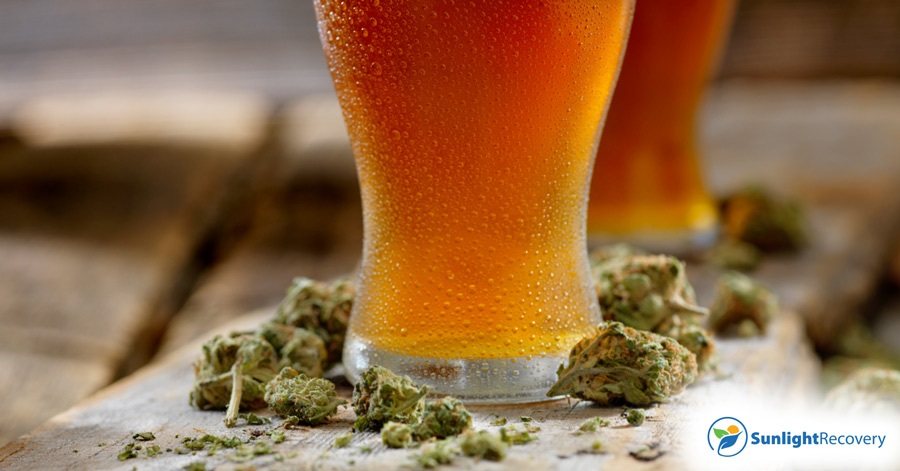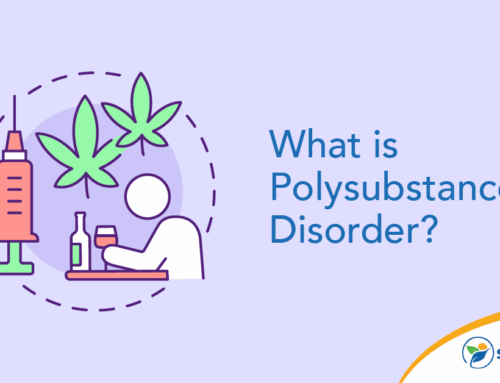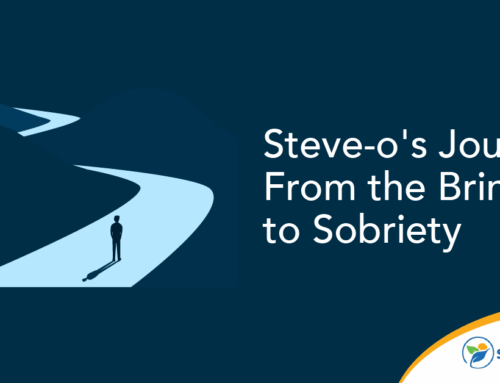Many people around the world use alcohol and weed for recreational purposes. According to research, marijuana is the most commonly used drug among those who drink alcohol. People may try mixing alcohol and weed to enhance the effects of each substance or combat the side effects of one over the other. Despite this being a common practice, mixing weed with alcohol can pose serious health risks if you aren’t careful.
What Are the Effects of Marijuana?
Marijuana, also known as weed, pot or dope, refers to the dried leaves, seeds, flowers and stems of the cannabis plant. The drug can either be smoked or mixed into food, such as brownies, cookies or candy. In 2019, an estimated 48.2 million Americans reported using marijuana, making it the most commonly used illicit drug in the United States.
When a person smokes marijuana, the mind-altering chemical tetrahydrocannabinol (THC) passes from the lungs into the bloodstream. The blood then carries this chemical to the brain and other bodily organs. Marijuana over-activates specific brain cell receptors that play a role in brain development and function, which causes the “high” most people feel after consuming it. Other effects of weed include:
- Mood changes
- Altered sense of time
- Impaired body movement
- Difficulty with problem-solving or thinking
- Impaired memory
Hallucinations or delusions can also occur when marijuana is taken in high doses. Because weed affects brain development, people who start using the drug as a teenager can experience impaired memory, thinking and learning functions. Long-term usage can also result in breathing problems, intense nausea or vomiting and problems with child development during and after pregnancy.
What Are the Effects of Alcohol?
According to the National Institute on Alcohol Abuse and Alcoholism, about 85.6% of the United States’ adult population reported drinking alcohol at some point in their lifetime. Many people drink the occasional beer or glass of wine during dinner or special occasions, which seems relatively harmless. However, long-term excessive drinking can cause serious health problems.
Alcohol is a depressant that slows down brain activity, interfering with essential communication pathways. This can disrupt an individual’s mood and behavior, making it difficult to think and move. There are several short- and long-term health risks associated with consuming alcohol. Short-term risks include:
- Alcohol poisoning
- Increased heart rate
- Slower reflexes
- Impaired memory
- Sleep problems
- Dehydration
Prolonged drinking can potentially damage vital organs in your body, causing long-term health risks, including:
- Cardiovascular issues, such as cardiomyopathy, irregular heart beat or stroke
- Brain shrinkage
- Loss of gray or white matter
- Alcoholic hepatitis
- Liver cancer
- Pancreatitis
- Weakened immune system
While alcohol is linked to many physical health problems, drinking can also negatively affect your mental health. Some people may turn to alcohol to reduce symptoms associated with a mental illness, but this can often have the opposite effect. Being a depressant, alcohol can affect your thoughts, mood or behavior and enhance feelings of depression or anxiety. Consuming alcohol can also encourage reckless or impulsive behavior, leading to harmful actions, such as self-harm or suicide.
The Risks of Mixing Alcohol and Weed
When you mix weed and alcohol, you’re combining two depressants that can negatively affect your brain and body. A depressant doesn’t necessarily make you feel sad or depressed after taking it, but it does slow down brain activity, which can cause a slower reaction time, poor memory, reduced attention and a loss of motor coordination.
Both alcohol and THC impact the endocannabinoid system (ECS) of the brain. Its purpose is to regulate brain chemistry, but combining beer and weed can over-activate the system, enhancing the depressant effect of each substance. This can lead to dangerous behavior due to impaired judgement and serious short- and long-term side effects that can impact your physical health.
Short-term Effects
Mixing alcohol and weed can cause several dangerous short-term side effects. For instance, using both substances together can make you feel less drunk, meaning you’re likely to drink more. This can lead to consuming an excessive amount of alcohol in one night, increasing the risk of alcohol poisoning.
Because weed can make you feel less drunk, it can trick you into feeling like you’re okay to drive, even when this isn’t the case. The depressive effects of both weed and alcohol increase when taken together, which means you may feel okay to drive, even though your brain is more impaired from both substances. This impaired judgement can lead to other physical dangers as well, such as risky sexual behavior.
Lastly, weed can suppress the gag reflex, making it harder to vomit alcohol if you do drink too much. You won’t be able to get the alcohol out of your system, which can make these short-term effects last even longer.
Long-term Effects
There are a few long-term effects of mixing alcohol and weed. One is the impact it can have on your mental health, such as an increased chance of experiencing depression or anxiety. Since using marijuana and alcohol simultaneously can influence you to drink more, there’s a higher risk of binge drinking, which increases your likelihood of developing an alcohol use disorder.
Mental health and substance use issues can impact other areas of your life, including school, work or relationships. Using both substances can also put you at risk of getting into a car accident or receiving a traffic ticket from driving under the influence due to impaired judgement and feeling less drunk. This may result in other long-term effects such as physical injuries or financial hardship.
When to Get Help
If you or someone you know is consistently mixing weed with alcohol, seeking medical attention may be necessary. It’s especially important to get help if someone is experiencing any signs of alcohol overdose, which can include vomiting, loss of consciousness, low body temperature, damp skin, irregular breathing or seizures.
Harm-reduction strategies, such as using both substances less frequently, sticking to standard drink amounts and waiting a while to use weed after consuming alcohol, can minimize your risk. Substance abuse treatment, such as counseling or therapy, can also help you overcome your substance use in a healthy way.
Overall, it’s best to avoid mixing weed and alcohol completely. If you’re struggling with substance use, Sunlight Recovery offers various treatment programs that can help you get your life back on track. Contact us today to learn more about our services and take the first step toward recovery.







